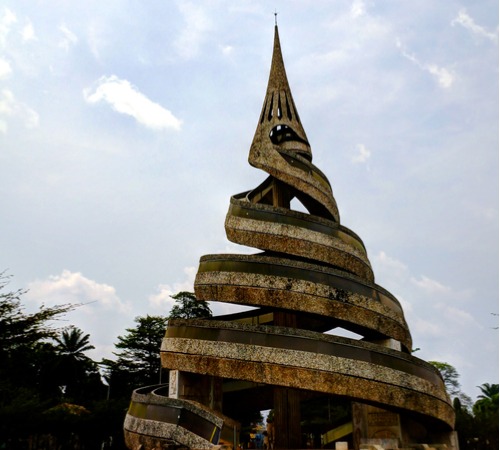Some Reflections on the Anglophone Crisis in Cameroon.
The crisis situation in the English-speaking part of Cameroon is the result of a series of strikes by several unions and the subsequent responses deemed insufficient and disproportionate by the Government. Attempts to dialogue with these bodies have failed, and the two English-speaking regions of the Northwest and Southwest have been militarized. These strikes have become manifestations of a demand for independence and against the marginalization of the Anglophone populations of the country. Today, opinions on the form of the State, launched by professional organizations and civil society associations now publicly claiming to be citizens of Southern Cameroons or Ambazonia, are divided.
For the Government in place, Cameroon is united and indivisible; there is no question of changing the structure of the centralized unitary State. For them, going back to federalism is opening the door to secessionism. Others stress the importance of federalism, which is a source of hope for democracy, good governance, and development.
The current situation in Cameroon and the growing concerns of the population about this crisis have led me, once again, to contribute to the debate with concrete proposals based on the experiences of more or less successful federations. The “Anglophone problem” goes back to the history of Cameroon. A former German colony, the territory of Cameroon was placed under the tutelage of the League of Nations at the end of World War I and entrusted to the joint administration of France and the United Kingdom. The former territory administered by France gained its independence under the name of the Republic of Cameroon in 1960. In 1961, it was joined by the southern part of the territory under British administration. The northern part preferred a union with Nigeria to form the Federal Republic of Cameroon. Ahmadou Ahidjo, who was elected president in 1960, then organized a referendum in 1972 to end federalism and initiate a unitary state, the United Republic of Cameroon, renamed Republic of Cameroon since 1984. Nevertheless, the conditions for the organization of this referendum remain to this day a point of discord!
Like the French Constitutions since 1792, the Cameroonian Constitution of 1996, repealing that of 1972, stipulates that the Republic of Cameroon “is one and indivisible”. Like Ahidjo at the time, Biya believes that unity is the strength of our country. However, the ongoing underperformance of the country at all levels and the effect of a weak implementation of the decentralization policy since 1996 refute their positions.
Cameroon’s image has seriously deteriorated because of widespread corruption, unjustifiable social degradation, or lack of leadership. Its ranking between 2002 and 2010 on Transparency International’s Corruption Perception Index is disgraceful. In 2015, Cameroon was ranked 130th out of 168 countries on the same index, with a score below the African average of 33. Similarly, the Mo Ibrahim Index of African governance in 2016 shows a score of 45.7 (out of 100) for global governance and a ranking of 38 (out of 54) with a negative evolution (-0.1) since 2006, lower than the African average.
Analysts argue that the hyper centralization of power in Yaounde is the main reason for this poor performance. Another reason is the inertia repeatedly denounced by President Biya. This has a negative effect on the daily life of Cameroonians and add to the ill-being of our marginalized “Bamenda” brothers, hence, the current crisis!
Those who mock the federalist demands of professional organizations and civil society associations in the English-speaking regions are unaware that the modern history of institutions is replete with examples of federations that have emerged mainly from aggregation (United States of America, Switzerland, Germany, United Arab Emirates), mixed system (Austria, Canada, Nigeria, Malaysia), or disaggregation (Belgium, Spain, South Africa).
The limits of the Cameroonian Constituent Act of 1996 are linked to the form of the State, which is a decentralized unitary State and not a regional State, much less a federal State. The Decentralization Law of 2004 enshrines the transfer of special powers and appropriate means from the State to decentralized territorial authorities with the objective of promoting development, democracy, and good governance at local level.
The evaluation of this reform through the implementation of the Community Development Programs (CDPs) sponsored by the Councils and activities of the National Participatory Development Program (NPDP) shows that we are far from the initial objectives. Given the failure to implement decentralization policies, federalism seems to be the ultimate hope for the revival of local and regional development against the current hyper centralization of power. Experience has shown that a relationship exists between federalism and democracy, federalism and governance, federalism and development, and ultimately, federalism and the well-being of the population.
The bad news for advocates of federalism is that the task ahead is huge, based on the number of federations that have failed in Africa. In neighbouring Nigeria, a disturbing correlation exists between the antithesis of federalism and political problems (State of Borno with Boko Haram) and bad governance (State of Bayelsa with MEND and the Niger Delta Avengers).
Federalism, or a genuine and effective form of decentralization, can help Cameroon break this vicious circle of centralization, crypto-democracy, and bad governance by bringing power closer to the people. To do this, the new form of the State must go beyond the Anglophone-Francophone divisions and the French vision of it inspired by Jean Jacques Rousseau by offering a modern model of five or six federated states officially using French, English, and if possible, a recognition of two local written languages.
Like Switzerland or Austria, it would be necessary to define a “federalism monitoring model” periodically to ensure its effectiveness with corrective measures where necessary. Deconcentrating power for the benefit of local and regional authorities is a long-term process that requires political will, a vision of development, a state of mind, and courage to reinvent the Cameroon of tomorrow!
